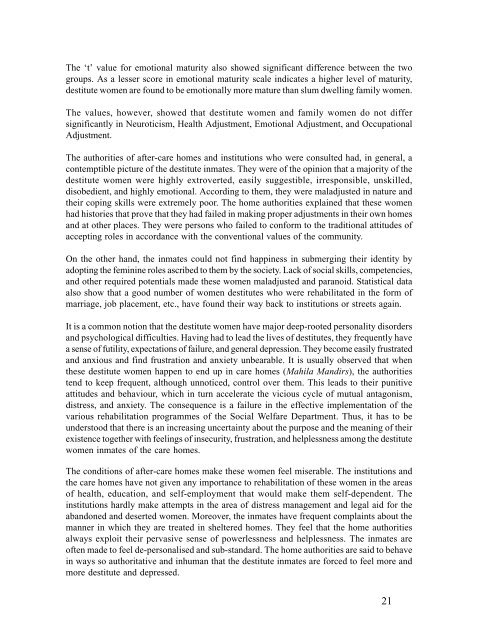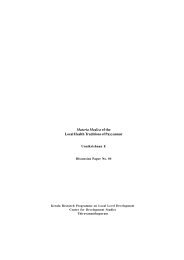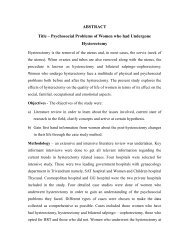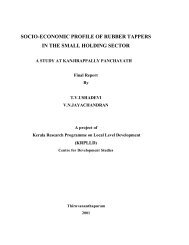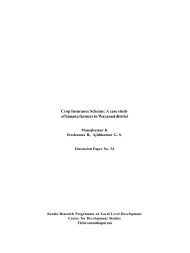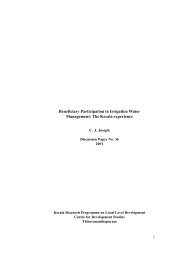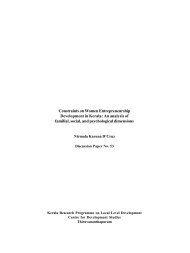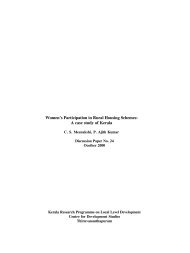Destitute Women in Kerala: Psychological resources and psycho ...
Destitute Women in Kerala: Psychological resources and psycho ...
Destitute Women in Kerala: Psychological resources and psycho ...
Create successful ePaper yourself
Turn your PDF publications into a flip-book with our unique Google optimized e-Paper software.
The ‘t’ value for emotional maturity also showed significant difference between the two<br />
groups. As a lesser score <strong>in</strong> emotional maturity scale <strong>in</strong>dicates a higher level of maturity,<br />
destitute women are found to be emotionally more mature than slum dwell<strong>in</strong>g family women.<br />
The values, however, showed that destitute women <strong>and</strong> family women do not differ<br />
significantly <strong>in</strong> Neuroticism, Health Adjustment, Emotional Adjustment, <strong>and</strong> Occupational<br />
Adjustment.<br />
The authorities of after-care homes <strong>and</strong> <strong>in</strong>stitutions who were consulted had, <strong>in</strong> general, a<br />
contemptible picture of the destitute <strong>in</strong>mates. They were of the op<strong>in</strong>ion that a majority of the<br />
destitute women were highly extroverted, easily suggestible, irresponsible, unskilled,<br />
disobedient, <strong>and</strong> highly emotional. Accord<strong>in</strong>g to them, they were maladjusted <strong>in</strong> nature <strong>and</strong><br />
their cop<strong>in</strong>g skills were extremely poor. The home authorities expla<strong>in</strong>ed that these women<br />
had histories that prove that they had failed <strong>in</strong> mak<strong>in</strong>g proper adjustments <strong>in</strong> their own homes<br />
<strong>and</strong> at other places. They were persons who failed to conform to the traditional attitudes of<br />
accept<strong>in</strong>g roles <strong>in</strong> accordance with the conventional values of the community.<br />
On the other h<strong>and</strong>, the <strong>in</strong>mates could not f<strong>in</strong>d happ<strong>in</strong>ess <strong>in</strong> submerg<strong>in</strong>g their identity by<br />
adopt<strong>in</strong>g the fem<strong>in</strong><strong>in</strong>e roles ascribed to them by the society. Lack of social skills, competencies,<br />
<strong>and</strong> other required potentials made these women maladjusted <strong>and</strong> paranoid. Statistical data<br />
also show that a good number of women destitutes who were rehabilitated <strong>in</strong> the form of<br />
marriage, job placement, etc., have found their way back to <strong>in</strong>stitutions or streets aga<strong>in</strong>.<br />
It is a common notion that the destitute women have major deep-rooted personality disorders<br />
<strong>and</strong> <strong>psycho</strong>logical difficulties. Hav<strong>in</strong>g had to lead the lives of destitutes, they frequently have<br />
a sense of futility, expectations of failure, <strong>and</strong> general depression. They become easily frustrated<br />
<strong>and</strong> anxious <strong>and</strong> f<strong>in</strong>d frustration <strong>and</strong> anxiety unbearable. It is usually observed that when<br />
these destitute women happen to end up <strong>in</strong> care homes (Mahila M<strong>and</strong>irs), the authorities<br />
tend to keep frequent, although unnoticed, control over them. This leads to their punitive<br />
attitudes <strong>and</strong> behaviour, which <strong>in</strong> turn accelerate the vicious cycle of mutual antagonism,<br />
distress, <strong>and</strong> anxiety. The consequence is a failure <strong>in</strong> the effective implementation of the<br />
various rehabilitation programmes of the Social Welfare Department. Thus, it has to be<br />
understood that there is an <strong>in</strong>creas<strong>in</strong>g uncerta<strong>in</strong>ty about the purpose <strong>and</strong> the mean<strong>in</strong>g of their<br />
existence together with feel<strong>in</strong>gs of <strong>in</strong>security, frustration, <strong>and</strong> helplessness among the destitute<br />
women <strong>in</strong>mates of the care homes.<br />
The conditions of after-care homes make these women feel miserable. The <strong>in</strong>stitutions <strong>and</strong><br />
the care homes have not given any importance to rehabilitation of these women <strong>in</strong> the areas<br />
of health, education, <strong>and</strong> self-employment that would make them self-dependent. The<br />
<strong>in</strong>stitutions hardly make attempts <strong>in</strong> the area of distress management <strong>and</strong> legal aid for the<br />
ab<strong>and</strong>oned <strong>and</strong> deserted women. Moreover, the <strong>in</strong>mates have frequent compla<strong>in</strong>ts about the<br />
manner <strong>in</strong> which they are treated <strong>in</strong> sheltered homes. They feel that the home authorities<br />
always exploit their pervasive sense of powerlessness <strong>and</strong> helplessness. The <strong>in</strong>mates are<br />
often made to feel de-personalised <strong>and</strong> sub-st<strong>and</strong>ard. The home authorities are said to behave<br />
<strong>in</strong> ways so authoritative <strong>and</strong> <strong>in</strong>human that the destitute <strong>in</strong>mates are forced to feel more <strong>and</strong><br />
more destitute <strong>and</strong> depressed.<br />
21


